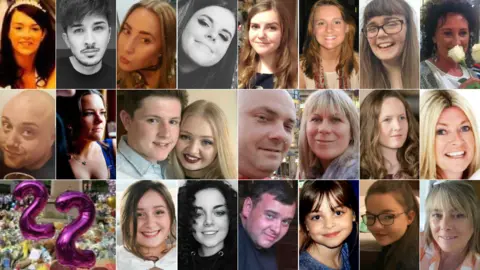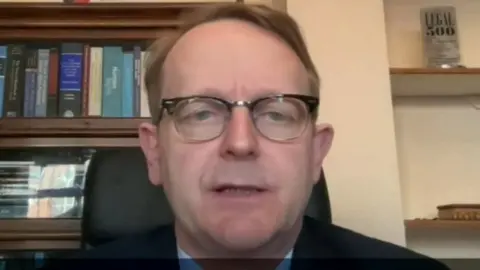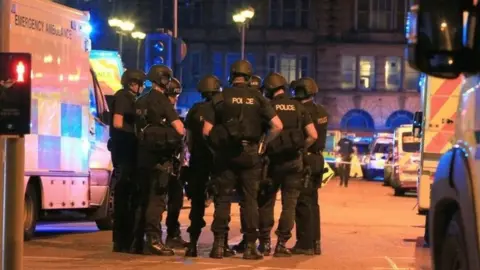Manchester Arena Inquiry: 'Multiple chances' to prevent atrocity
 Family handouts
Family handoutsFamilies of the 22 people killed in the Manchester attack have told the inquiry into the atrocity there were "multiple opportunities" to prevent it.
The inquiry also heard claims Salman and Hashem Abedi must have been knowingly helped by others to plan and prepare the 2017 suicide attack.
Lawyers for the families of the victims have been making closing statements about the radicalisation of the pair.
They also gave statements about the actions of the security services.
Pete Weatherby QC, who represents seven families, told the inquiry how bomber Salman Abedi was not a "lone actor who emerged from nowhere to commit an atrocity".
"This was not a low-sophistication methodology which meant the conspiracy to bomb the arena was difficult to spot or at least to disrupt," he said.
"This was the most complicated attack in this country since at least 7/7."
In a written submission, Mr Weatherby said it was "a plot which involved acts by a significant number of people, innocent or otherwise."
He said that "meant there were multiple opportunities to uncover and prevent the outrage".
Salman Abedi had been known to MI5 for many years before he carried out the attack and was known to be in contact with terror suspects.
The hearing has previously been told that in the months prior to the bombing two pieces of intelligence were received by MI5 about him which were "highly relevant" to the planned attack but was assessed at the time to relate to non-terrorist criminality.
Duncan Atkinson QC, representing six families, said intelligence "should have been assessed and handled differently".
 Manchester Arena Inquiry
Manchester Arena InquiryMr Weatherby said if "greater attention" had been paid to Salman Abedi, then the "numerous overt actions and communications of the plot thereafter should have been visible".
"The problem was that despite numerous warning signs, no one was watching."
The security service has previously admitted it missed chances to investigate the suicide bomber in the months before the atrocity, including not stopping him at Manchester Airport as he arrived from Libya just four days before he carried out the attack.
Mr Weatherby said Abedi may have had the bomb "switch" on him if he had been stopped at that time and it was likely the attack would have been disrupted.
The inquiry also heard claims Salman and Hashem Abedi did not act alone and others knowingly helped.
Mr Weatherby said it was unlikely the brothers constructed the bomb "without instruction and guidance".
He suggested "one or both received training, probably in Libya".
'Defies gravity'
There were also claims about friends and associates of Salman Abedi who were used to buy chemicals for the bomb and a car that the explosives were stored in.
"Some of those involved probably were innocent but it is absolutely untenable to pretend that they all were," Mr Weatherby said.
He said MI5's claim that nobody other than the brothers were "knowingly involved" had "damaged MI5's credibility before the families" and "defies gravity".
Mr Weatherby said that was also inconsistent with the views of Greater Manchester Police, who said there are outstanding suspects they still want to speak to.
Mr Weatherby said the inquiry should conclude clearly whether Abedi's friends and associates knew or probably knew of the plot.
 PA Media
PA MediaInquiry chairman Sir John Saunders told the hearing he was "reluctant" to say in his report whether individuals were knowingly involved or not in case it prejudiced future prosecutions.
John Cooper QC, representing the families of 12 victims, told the inquiry the evidence showed that convicted terrorist organiser Abdulraouf Abdallah had groomed his friend Salman Abedi into a suicide bomber and was aware of his plans to target the arena.
Mr Abdallah denies any knowledge of or involvement in the atrocity, but Mr Cooper claimed Abdallah's evidence to the inquiry was "cynical lies".
He added that Didsbury Mosque, where the Abedi family worshipped, had failed to confront extremism in the run up to 2017 and continued to do so today and invited Sir John to refer the case to the Charities' Commission to reconsider the mosque's charitable status.
A trustee of the mosque has previously told the inquiry the mosque was "mainstream" and extremism was against its ideology.
The final day of the inquiry's hearings will be held on Tuesday.

Why not follow BBC North West on Facebook, Twitter and Instagram? You can also send story ideas to [email protected]
